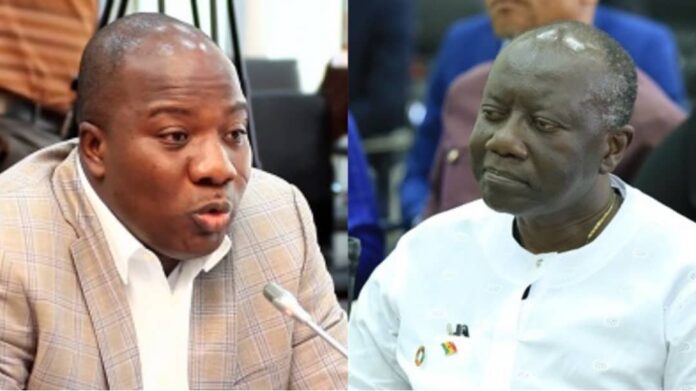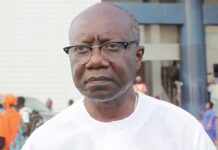The Member of Parliament for Bawku Central, Mahama Ayariga, has petitioned the offices of the World Bank and the International Monetary Fund (IMF) in Ghana to reject support to a Ghana Financial Stability Fund (GFSF) being created by the Finance Minister.
According to the MP, the Minister, Kenneth Nana Yaw Ofori-Atta is “using mere guidelines and putting it under the administration of an illegal and unconstitutional body known as Ghana Amalgamated Trust Plc (GAT) based on opaque and legislatively unauthorized management and disbursement mechanisms.”
His reason according to a Friday, November 3, 2023 statement issued is that the scheme possesses the “potential to deprive private indigenous bank owners the ownership of their assets in these banks”, a tragedy which the former Information Minister says is due to how Ken Ofori-Atta’s “mismanagement of the financial sector has rendered these banks vulnerable.”
He has explained the unconstitutionality of the Ghana Amalgamated Trust Plc (GAT) saying it lacks parliamentary approval and it is shrouded with fraud.
Below is the full statement issued by the MP:
GHANA FINANCIAL STABILITY FUND
THE COUNTRY HEAD
WORLD BANK COUNTRY OFFICE
ACCRA
GHANA
THE COUNTRY HEAD
IMF MISSION OFFICE
ACCRA
GHANA
Dear Sirs,
UNCONSTITUTIONALITY AND ILLEGALITY OF THE OPERATIONAL FRAMEWORK OF THE GHANA FINANCIAL STABILITY FUND AND ADMINISTRATION BY GHANA AMALGAMATED TRUST (GAT)
I write to request the World Bank (WB) and the International Monetary Fund (IMF) country offices in Ghana not to lend your support to the unconstitutional and illegal attempt by the Minister of Finance and Economic Planning (Mr. Ken Ofori Atta) to establish a Ghana Financial Stability Fund (GFSF) using mere guidelines and putting it under the administration of an illegal and unconstitutional body known as Ghana Amalgamated Trust Plc (GAT) based on opaque and legislatively unauthorized management and disbursement mechanisms. It is a scheme with the potential to deprive private indigenous bank owners the ownership of their assets in these banks after his mismanagement of the financial sector has rendered these banks vulnerable. And it has not been subjected to parliamentary oversight and scrutiny.
I refer to the publication by the Ministry of Finance and Economic Planning (MOFEP) dated 22nd August 2023 which indicates that the Government of Ghana (GoG) has established a Ghana Financial Stability Fund (GFSF). The Fund is expected to be funded by the Government of Ghana and the World Bank/IMF as its major donor. In the said document, the MoFEP is indicating that it will seek to offload an amount of about $750 million to Ghana Amalgamated Trust (GAT) Ltd to be the main agency responsible for disbursing such funds.
On 3rd March 2022, as a member of the minority in Parliament, I brought an action at the Supreme Court of Ghana to challenge the legality of GAT and the fraudulent activities of GAT and its operations in the case of Mahama Ayariga v. Attorney General & Others (Suit No. J1/20/2022). The issue is currently pending.
It is therefore strange that GAT and MoFEP, knowing well that the case is still pending in court will still want to undertake an illegality this time on a very large scale.
Unconstitutionality of GAT
- The Ghana Financial Stability Fund(GFSF) lacks parliamentary approval and has a fraudulent structure intended to deprive owners of local indigenous banks of their property rights. We believe GAT is a well-orchestrated scheme to acquire private banks which have been rendered vulnerable by the bad policies of the Finance Minister and who might desperately go for lifeline support from GAT.
- GAT was sponsored by the Government of Ghana as a limited liability company under the Companies Act, 2016 (Act 992). The Minister of Finance in 2019 had an arrangement with GAT, as the sponsor and with NTHC as trustee shareholder in GAT which arrangement allowed NTHC as trustee to hold shares in GAT on behalf of Government. We have contended in court that this is an unconstitutional scheme to transfer public funds to private ownership without the requisite parliamentary approval.
- Article 192 of the Constitution of the Republic of Ghana states categorically that a “public corporation shall not be established except by an Act of Parliament.” Article 179 recognizes the setting up of public corporations as commercial ventures. The current arrangement by which the Government of Ghana seeks to use NTHC Ltd to hold shares in GAT for a commercial venture offends the Constitutional requirement, which vests Government with the authority to only engage in a commercial venture through the medium of a public corporation enacted by an Act of Parliament.
- Government cannot, in seeking to evade parliamentary oversight, indirectly incorporate a company and nominate a private entity to hold its shares in the company on behalf of the Government under a so-called trusteeship arrangement. This offends the 1992 Constitution.
- In paragraphs 217 to 220 of the Government’s Economic Policy and Budget Statement of 2020, the Minister of Finance sought to explain the circumstances under which GAT was formed and approval was sought from Parliament for him to issue a sovereign guarantee to enable GAT, which is a limited liability company whose shares are held by a non state entity, to raise GHS800 million. When the Minister was unable to raise funds through a bond, he requested Parliament to approve GHS800 million for the “initial capitalization of GAT for its investment in the four (4) participating banks”.
- The Constitution, in Article 181 (1) makes provision for Parliament, by a resolution supported by the votes of a majority of all the members of Parliament, to authorize the Government to enter into an agreement for the granting of a loan out of any public fund or public account. And after the agreement is entered into, it shall not come into operation unless it is laid before Parliament and approved by a resolution of Parliament.
- Parliamentary approval of a loan out of the public funds is a two-staged process. The process begins with the authorization by Parliament of the entry into the agreement by the parties. After the agreement has been entered into, Parliament then gives its approval for the agreement to become operational on the terms and conditions presented to parliament.
- The Minister of Finance, in failing to obtain Parliamentary approval for the agreement to become operational on stated terms renders the agreement so entered into between the Minister of Finance and GAT unconstitutional, thereby making the whole transaction null and void.
The legality and constitutionality of GAT and the arrangement to put the GHC800m under GAT are the subject of the suit in Mahama Ayariga v. Attorney General & Others.
“Operational Framework of the Ghana Financial Stability Fund (GFSF)”
The Ministry of Finance in a document entitled “Operational Framework of the Ghana Financial Stability Fund (GFSF)” stated that “The conclusion of Phase 2 of the DDEP has further impaired the balance sheet of banks and other participating financial institutions. To help mitigate the impact of the GoG debt operation on the financial sector, GoG is establishing the Ghana Financial Stability Fund (GFSF) to provide solvency and liquidity support for the financial sector as needed.”
The document further states that “VII. An initial allocation of US$750m, consisting of US$250m loan facility from the World Bank/IDA and US$500m from the GoG, has been earmarked for the solvency window of the GFSF.”
The document added that it is “the operational framework of the GFSF” and “sets out in detail the set up of the fund including the sources of funding, PFIs eligibility criteria for accessing the fund, the terms and conditions, and governance arrangements of the fund, among others.”
The document is clear that “The GoG is accordingly allocating budgetary resources for the establishment of the Ghana Financial Stability Fund (GFSF) to minimize the adjustment burden on the financial sector, particularly, banks, and insurance companies over the medium-term, and to avoid any systemic financial crisis.”
The document indicates that “The GFSF is being operationalized through two windows: a Solvency window (Fund A) and a Liquidity window (Fund B).”
“The Solvency window is expected to provide recapitalization support to financial institutions whose solvency is adversely impacted by the DDEP and to help restore them to full compliance with minimum regulatory capital requirements in the shortest possible time and no later than the end of the ECF programme.
- This window will be designed as two distinct but complementary sub-funds (Fund A1 and Fund A2) under the GFSF, reflecting financing support from the World Bank/IDA (Fund A1) and from GoG directly (Fund A2).”
The document reveals that “For state-owned financial institutions, there will be direct investment from Government. With privately owned institutions, there will be an indirect investment through the Ghana Amalgamated Trust (GAT). This is to minimize any direct GoG involvement and ownership in any of these institutions.” (Emphasis added).
It is indicated in the document that “GAT will serve as the Secretariat for Solvency Fund A2 and will setup ring-fenced operational framework, approved by the MoF, to guide its operations. GAT will also hold in trust for the Government, GoG’s investment in the privately owned financial institutions. As part of its roles, GAT will conduct investment analysis, recommendations, due diligence, post investment monitoring and report to the IC.”
Unconstitutionality and Illegality of the “Operational Framework of the Ghana Financial Stability Fund (GFSF)”
A combined reading of articles 175, 176 178 and 179 of the Constitution of Ghana requires that the Ghana Financial Stability Fund (GFSF) be established by a express Act of Parliament with clear legal stipulation regarding its administration and mechanisms for disbursing the funds and how the funds should be recovered.
It is illegal and unconstitutional to seek to establish such public funds by mere administrative guidelines issued by the Ministry of Finance. The Ministry of Finance is seeking to use opaque and unscrutinized (by Parliament) mechanisms that will be clearly open to their absolute discretion in clear disregard to the arrangements contemplated by the Constitution of Ghana 1992.
The International Monetary Fund (IMF) and the World Bank will be acting in clear violation of the Constitution of Ghana of 1992 if they lend their support to this arrangement or are in anyway party to it.
Article 175 of the Constitution provides for the establishment of public funds by an express Act of Parliament. Article 176 provides for funds received on behalf of the public to be paid into the Consolidated Fund or a fund established by or under the authority of an Act of Parliament. Article 178 then details the proper legal mechanisms for withdrawal of money from public funds. The mechanisms provided for in the “Operational Framework of the Ghana Financial Stability Fund (GFSF)” is an unintelligent attempt to evade legal and constitutional scrutiny as mandated by our constitution.
Please accept considerations of my highest regards.
Thank you
Mahama Ayariga Esq. MP
Bawku Central
- Governor, Bank of Ghana
- Attorney General and Minister for Justice
- Speaker, Parliament of Ghana
- President, Association of Bankers













